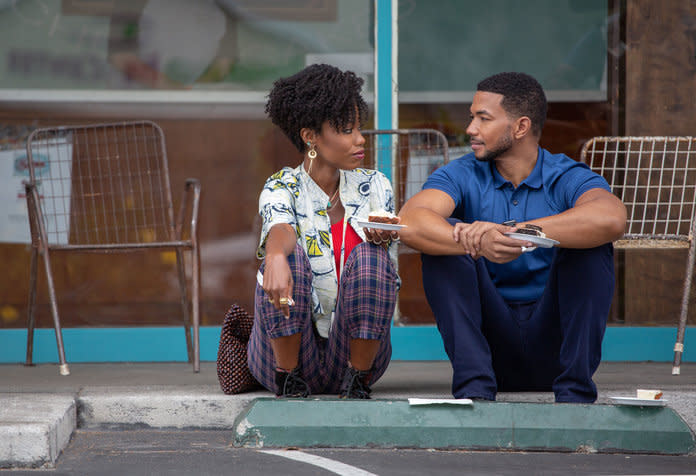Ava DuVernay Went the Extra Mile (and Then Some) to Ensure Gender Equality on Her Set
In 2015, the predominately white Oscar nominations inspired the #OscarsSoWhite social campaign, which in turn led the Academy of Motion Picture Arts and Sciences to make sweeping changes to alter the makeup of their voting body. And yet, five years later we continue to find ourselves in the same predicament: a disappointing lack of diversity demonstrated by the bigger awards shows, and the Oscars in particular.
As the year’s most anticipated award show — taking place on Feb. 9 — gets closer, InStyle spoke to prolific filmmaker Ava DuVernay about the 2020 Oscar nominations, where women were entirely shut out of the Best Director category, and racial diversity was severely lacking, with Cynthia Erivo the only person of color nominated in the acting category.
“I feel not good about it,” DuVernay told us earlier this month at the TCA Winter Press Tour, days after the nominations were announced. “There needs to be change and it needs to be seriously strategized as opposed to chest beating and people being defensive or [creating] temporary solutions. It's a systemic issue.”
As one of the most vocal critics of the lack of diversity and gender parity in the film industry, DuVernay rejects the idea that just fixing the awards shows will lead to sustainable change. “It's like asking the question, how do you change sexism? How do change racism? How do you change climate issues? These are systemic, deeply ingrained generational issues that can't be answered in one season of awards, in one article, and one sound bite,” said DuVernay, who in 2013 became only the second black woman, after Kasi Lemmons, to be included into the director’s branch of the Academy. “It's going to take work.”
So how does one create lasting change in an industry that is notoriously slow to evolve? DuVernay thinks one place to start is by attempting to assemble film crews that consist of 50% women. “Beyond the story itself, I think there are ways that we can be more muscular in our business practices in this industry. And one of them is not just what we're making but the way we're making it,” said the director, who has hired exclusively female directors for her OWN series, Queen Sugar.
While working on her newest series, Cherish the Day, DuVernay discovered first-hand how difficult it is to reach gender parity, even when there is a strong desire to do better. “This was a real exercise and experiment: Could we, in making this show, have equal numbers of men and women on set? Is it even possible?” she said. “When OWN and Warner Brothers gave us the chance to make this in Los Angeles, I said, ‘This is the show. Let me try this.’ It informed me on the things that we need to do industry-wide to achieve parity, because I've done it and I know how hard it is.”
In order to have equal numbers of men and women working on set, a lot more digging is required — especially given that many of the departments are traditionally male-dominated. “They are there, but if every man that you talk to is only referring another man, if every white person you talk to is only referring another white person, then how am I ever going to get to women? How am I ever going to get to gender fluid people?” she said. Now that she has risen to the challenge, DuVernay wants to help the next filmmaker do the same. “It's really trying to think about, what are the systems we can put in place so that it's easier to find folk? Don't just fix the wound on top, get to the disease.”
RELATED: Ava DuVernay on How to "Pivot Towards Positivity" in Trying Times
While DuVernay has become a spokesperson for inclusion in the industry — she founded ARRAY, a grassroots company that helps distribute films by people of color and women, she serves as the co-chair of the Prada Diversity and Inclusion initiative, and she’s a partner of the Evolve Entertainment Fund, which aims to elevate voices of people of color in the fashion and entertainment industries — the idea of being thought of for her activism before her filmmaking still makes her uncomfortable. “I think that's regrettable,” said the filmmaker. “I know black film lovers who don't have to think about blackness when they watch themselves in my work. It's not a story. I think when non-black people, particularly Caucasian folk watch my work, it's filled with the political for them because they're negotiating with images and stories that they're unfamiliar with.”

That said, even though Cherish the Day is fundamentally a love story, showing us eight days during a five-year relationship that alter the course of one couple, DuVernay can’t help but pepper some sociopolitical messages into the narrative. “Why do it otherwise? I think there's a way to entertain. I think there's a way to tantalize. I think there's a way to fantasize. But underneath it, it has to have a beating heart,” she said. “I think that I naturally try to say something and make it mean something, not to be empty calories.”
Cherish the Day premieres February 11 on OWN.

